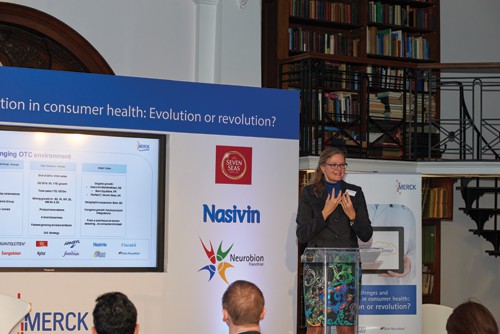
It’s an exciting time for the OTC sector. Consumers have never been more interested in wellbeing and, of course, avoiding illness. This is driving change, and quickly. The market is experiencing a significant shift as healthcare companies move to focus on OTC brands over prescription medicines. In fact, the OTC sector has now for several years been growing faster as a whole than the Rx market – mainly driven by emerging markets – and is currently worth more than ¤100bn. It is set to continue growing at over 4% per annum over the next 10 years – well above predicted increases in GDP. This growth is seen across all categories, including allergies, lifestyle, gastro-intestinals, analgesics, dermatologicals and medicines for coughs and cold, with leading companies achieving around 20% profit margin.
The OTC market remains fragmented, with the top 10 companies holding just over a quarter of market share. Mergers and acquisitions have shaken the market – the recent launch of a joint venture between GSK and Novartis is just one example of such developments influencing the commercial environment. Given the fragmented nature of the sector, it is possible that 2015 will see renewed M&A activity. As a telling example, companies that have traditionally focused more on FMCG have recently strengthened their efforts to enter the OTC marketplace. Reckitt Benckiser, for instance, is renewing its focus on ‘health, hygiene and home’.
For Merck Consumer Health, this changing landscape has provided us with the opportunity to steadily increase our market share and position – a situation driven by three key factors.
One, the company is backed by significant heritage and group strength; we are looking forward to our 350th birthday celebrations in 2018 and Merck Group is 70% family owned, which provides us with the flexibility to experience market pressures, but not be defined by them.
Second, we have based our decisions on a clear business strategy for establishing our market position. Growth and profitability have been key drivers. As things stand at the end of 2014, we have hit the $1bn sales mark, while operating in fast-growing emerging markets and delivering consistent top and bottom line growth, with profit and margins similar to leading competitors in the industry.
Third, as part of the Merck Group, Consumer Health has built on the market expertise of the other Merck businesses to establish its market position.
For Merck’s Consumer Health business, change and growth in operations has also been driven by the incorporation of new brands, transferred from Merck Serono. This has helped the shift towards greater revenues and earnings from emerging markets. The strategy has rested on the ‘3×3’ principle – establishing a minimum of 3% market share and at least 3 leading consumer brands in each market in which we compete. Ultimately, Consumer Health is a brand business, driven by products including Neurobion®, Dolo-Neurobion®, Bion®, Seven Seas®, Nasivin® and Femibion®. Among our strategic brands, significant growth in 2014 was experienced on Femibion, Seven Seas and Neurobion and in 2014 Consumer Health was Merck’s fastest growing business.
Consumers have never been more interested in wellbeing and, of course, avoiding illness
In the short- to mid-term, organic growth is anticipated through innovations to our existing key brands such as the recent Nasivin® Mentholfresh launch in Germany, Bion® Equilibre launch in France and Seven Seas® Perfect 7 debut in the UK. Geographic expansion will focus on key products in key markets, such as the introduction of Bion in Brazil. Inorganic growth may take place in the form of future product integrations. In the longer term, Merck Consumer Health aspires to break the ¤1bn income barrier through the systematic growth of its existing portfolio.
For Consumer Health at Merck, the journey to sustainable growth rests on a multi-functional, holistic and consumer-centric innovation process and marketing approach. We look forward to taking this forward in 2015 and beyond.




